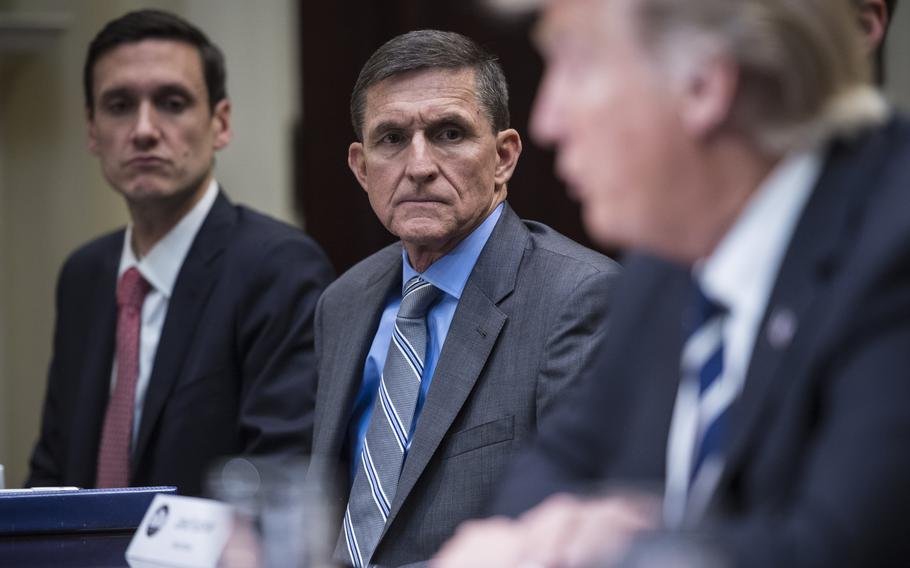
Michael Flynn, center, attends a meeting with President Donald Trump in January 2017. (Jabin Botsford/Washington Post)
WASHINGTON — Michael Flynn, the retired Army general and onetime adviser to President Donald Trump, was cited by the Defense Department inspector general for failing to disclose lucrative speaking engagements and other business arrangements with foreign entities, prompting the U.S. government to pursue tens of thousands of dollars in penalties against him, according to documents.
Investigators determined that Flynn received nearly $450,000 from Turkish and Russian interests in 2015, including for an appearance in Moscow alongside President Vladimir Putin, but found no records that he had sought government approval beforehand. Their findings are detailed in a January 2021 memo to the Army released through the Freedom of Information Act on Thursday.
The Army notified Flynn in a May 2 letter, obtained by The Washington Post, that it would seek to recoup $38,557.06 from him, zeroing in on money and in-kind compensation he received for a gala dinner celebrating the 10th anniversary of RT, the Kremlin-run news agency. Putin sat beside Flynn at the event and later told NBC News that he “didn’t even really talk to” him.
Flynn did not respond to a phone call and emails seeking comment.
Craig R. Schmauder, an Army lawyer, wrote in the letter that Flynn’s failure “to obtain the approvals of the Secretary of the Army and the Secretary of State resulted in a violation of the Emoluments Clause,” a provision of the U.S. Constitution that prohibits retired military personnel from receiving money from foreign governments without prior authorization.
“When there is a finding that a military retiree has violated the Emoluments Clause, the United States Government may pursue a debt collection,” Schmauder wrote to Flynn.
Schmauder added that the Army was requesting that the Defense Financing Accounting Service “seek recoupment from you of a debt in the amount of $38,557.06.” It was not clear why the Army sanctioned Flynn for the Moscow visit but not his other work.
Sean O’Donnell, the acting Defense Department inspector general, wrote in the January 2021 memo released Thursday that Defense Department regulations state that if a retired U.S. service member receives money from a foreign government without prior approval, it is considered “received by the retired member for the United States.”
“A debt in favor of the government is created which is to be collected by withholding from retired pay,” O’Donnell wrote.
In addition to the RT dinner in December 2015, O’Donnell’s memo highlights Flynn’s paid appearance at an October 2015 conference sponsored by Kaspersky Government Security Solutions, “an entity that appears to be controlled by the Russian government,” and Flynn’s work for Inovo BV, a corporation organized in the Netherlands that assisted the Turkish government.
The Army determined April 28 that Flynn violated the emoluments clause, Michael Brady, an Army spokesman, said in an email. The Army forwarded its findings to the Defense Finance and Accounting Service, which calculates how much is owed and handles collection.
Flynn acknowledged the financial penalty in a television interview broadcast in May, saying the Defense Department was “going to reach into my retirement and ... take some money out.”
“Yeah, it means something, but at the end of the day, this country means a heck of a lot more than what they will do to me,” Flynn said then, suggesting the punitive action was politically motivated.
Flynn was Trump’s first national security adviser but became ensnared in the Justice Department’s investigation of Russian interference in the 2016 election. He abruptly left the White House just weeks into the administration, later pleaded guilty to lying to the FBI about his contacts with Russia’s ambassador to the United States, and then attempted to reverse course before Trump eventually pardoned him in November 2020.
After Trump’s defeat, Flynn suggested to Trump that he declare martial law and force a “rerun” of the contest in key states that went for President Biden.
The Defense Department inspector general’s investigation was opened in April 2017 but languished for years while Flynn was the subject of a criminal investigation.
O’Donnell, the acting inspector general, wrote in his memo that his investigation had been “held in abeyance since June 2017, pending the resolution of criminal allegations against LTG Flynn.” LTG stands for lieutenant general, Flynn’s rank when he retired from the Army in 2014.
After Trump pardoned Flynn, the Justice Department informed O’Donnell’s office “that their interest in this matter is moot” and that the inspector general’s office “may proceed in a manner we deem appropriate,” the memo said.
The Washington Post’s Nate Jones and Shane Harris contributed to this report.